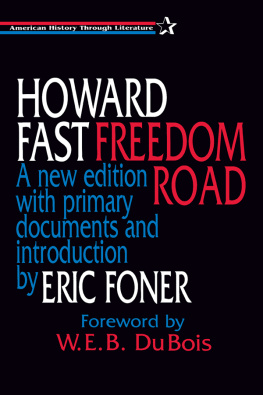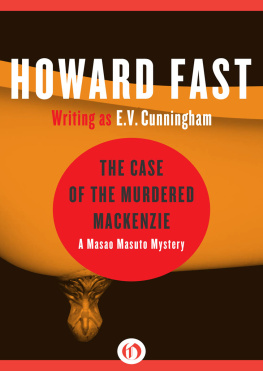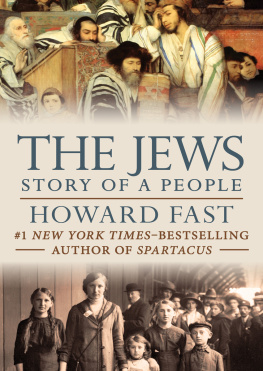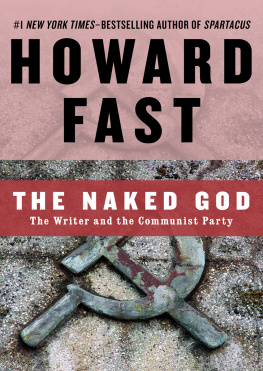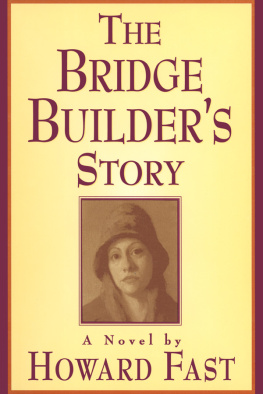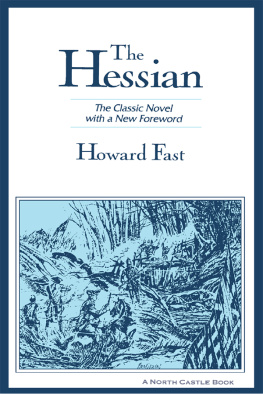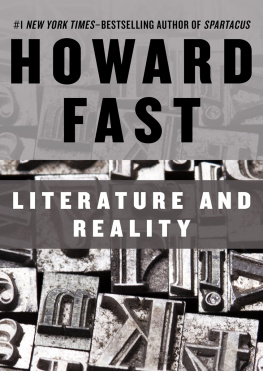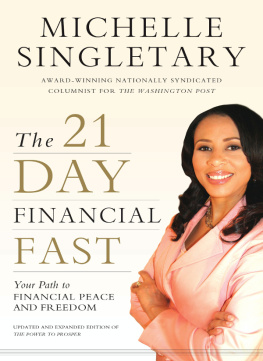First published 1995 by M.E. Sharpe
Published 2015 by Routledge
2 Park Square, Milton Park, Abingdon, Oxon OX14 4RN
711 Third Avenue, New York, NY 10017, USA
Routledge is an imprint of the Taylor & Francis Group, an informa business
Text copyright 1944 by Howard Fast
Introductions by Eric Foner copyright 1995 Taylor & Francis. All rights reserved.
No part of this book may be reprinted or reproduced or utilised in any form or by any electronic, mechanical, or other means, now known or hereafter invented, including photocopying and recording, or in any information storage or retrieval system, without permission in writing from the publishers.
Notices
No responsibility is assumed by the publisher for any injury and/or damage to persons or property as a matter of products liability, negligence or otherwise, or from any use of operation of any methods, products, instructions or ideas contained in the material herein.
Practitioners and researchers must always rely on their own experience and knowledge in evaluating and using any information, methods, compounds, or experiments described herein. In using such information or methods they should be mindful of their own safety and the safety of others, including parties for whom they have a professional responsibility.
Product or corporate names may be trademarks or registered trademarks, and are used only for identification and explanation without intent to infringe.
Library of Congress Cataloging-in-Publication Data
Fast, Howard, 1914
Freedom road / Howard Fast; foreword by W. E. B. Du Bois;
introduction by Eric Foner
p. cm.
ISBN 1-56324-602-3 (hbk. : alk. paper)
ISBN 1-56324-440-3 (pbk. : alk. paper)
1. ReconstructionFiction. I. Title
PS3511.A784F72 1995
813.52dc20 94-45329
CIP
ISBN 13: 9781563244407 (pbk)
ISBN 13: 9781563246029 (hbk)
To the memory of my beloved wife,
Bette Fast
Reconstruction, the turbulent era that followed the American Civil War, is one of the most neglected and misunderstood periods in our nations history. A survey of high school seniors conducted recently by the Los Angeles Times found that fewer were able to identify Reconstruction correctly than any other event or period about which they were asked. The highly acclaimed television series on the Civil War shown a few years ago on public television devoted most of its final episode to the postwar reunion of white Northerners and Southerners, passing over Reconstruction so quickly that it did not even mention the eras name. What the American public always wants, William Dean Howells once remarked, is a tragedy with a happy ending. Unfortunately, unlike the Civil War, Reconstruction did not end in a blaze of glory.
This neglect is particularly unfortunate because in many ways Reconstruction remains a part of our lives, nearly a century and a quarter after its end in 1877. During the Reconstruction years the United States attempted to come to terms with the twin consequences of the Civil Warthe reuniting of the nation and the destruction of slavery. On what terms should the defeated Confederacy be readmitted to the Union? What should be the new status of the former slaves? These were the questions on which the political crisis of Reconstruction turned. In demanding an end to the myriad injustices of slavery, incorporation as equal citizens into the political order, autonomy in their personal and religious lives, access to education, and land of their own, African Americans sought to breathe substantive meaning into freedom. In so doing, they helped to establish the agenda of this dramatic period.
During Reconstruction, after a bitter struggle between President Andrew Johnson, who succeeded the murdered Abraham Lincoln, and the Republican majority in Congress, the nation embarked on its first experiment in interracial democracy. In civil rights legislation and the Thirteenth, Fourteenth, and Fifteenth Amendments, Congress established a new vision of equality before the law, regardless of race, as the definition of American citizenship, and of the national government as the protector of the fundamental rights of all Americans. In 1867, black men throughout the South were accorded the right to vote. As a result, new state and local governments came to power and African Americans for the first time were elected to public offices, from Congress to local posts like sheriff and justice of the peace. Later, as Northern commitment to the principle of equality waned and Southern opponents organized a violent campaign to restore white supremacy, the new governments, one by one, were toppled. But the fundamental question raised by Reconstructionwhether American society is prepared to grant former slaves and their descendants genuine equality as members of our common nationeven today remains unresolved.
For much of this century, the history of Reconstruction was not so much ignored as systematically distorted by historians, politicians, novelists, and filmmakers. According to the traditional interpretation of the era, Reconstruction was a period of unrelieved sordidness in political and social life. The reason was what one scholar called negro incapacitythe childlike former slaves were unprepared for freedom and incapable of properly exercising the political rights Northerners had thrust upon them. They allowed themselves to be manipulated by unscrupulous adventurers from the North (carpetbaggers) and a few Southern whites anxious to reap the spoils of office (scalawags), with the result that Southern governments accomplished nothing except to raise taxes, with the funds pocketed by corrupt politicians. Finally, the white community organized itself to restore home rule through patriotic organizations like the Ku Klux Klan.
Originating in the propaganda of nineteenth-century opponents of black suffrage, this interpretation achieved scholarly legitimacy in the writings of William Dunning, John W. Burgess, and others at the turn of this century. It reached a mass audience through D. W. Griffiths film glorifying the Klan Birth of a Nation, which premiered at Woodrow Wilsons White House, and Claude Bowerss best-selling history of Reconstruction, The Tragic Era, published in 1929. Until the 1960s, it was incorporated in nearly all American history textbooks. Resting on the assumption that black suffrage was the gravest error of the entire Civil War era, this portrait survived for decades because it accorded with firmly entrenched American political and social realitiesthe disenfranchisement and segregation of blacks, the solid Democratic South (since Reconstruction had been created by the Republican party), and the widespread conviction that it would be a mistake for Northerners to intervene to change the Souths racial system.
This was the prevailing view of Reconstruction in 1944, when Howard Fast published Freedom Road. Born thirty years earlier, Fast had already written a number of well-received historical novels, including The Last Frontier



